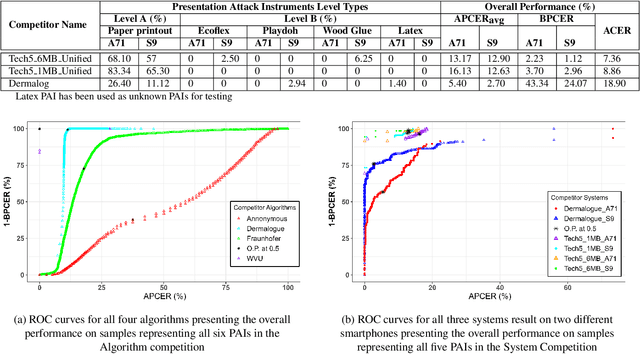Rahul Parthe
Liveness Detection Competition -- Noncontact-based Fingerprint Algorithms and Systems (LivDet-2023 Noncontact Fingerprint)
Oct 01, 2023



Abstract:Liveness Detection (LivDet) is an international competition series open to academia and industry with the objec-tive to assess and report state-of-the-art in Presentation Attack Detection (PAD). LivDet-2023 Noncontact Fingerprint is the first edition of the noncontact fingerprint-based PAD competition for algorithms and systems. The competition serves as an important benchmark in noncontact-based fingerprint PAD, offering (a) independent assessment of the state-of-the-art in noncontact-based fingerprint PAD for algorithms and systems, and (b) common evaluation protocol, which includes finger photos of a variety of Presentation Attack Instruments (PAIs) and live fingers to the biometric research community (c) provides standard algorithm and system evaluation protocols, along with the comparative analysis of state-of-the-art algorithms from academia and industry with both old and new android smartphones. The winning algorithm achieved an APCER of 11.35% averaged overall PAIs and a BPCER of 0.62%. The winning system achieved an APCER of 13.0.4%, averaged over all PAIs tested over all the smartphones, and a BPCER of 1.68% over all smartphones tested. Four-finger systems that make individual finger-based PAD decisions were also tested. The dataset used for competition will be available 1 to all researchers as per data share protocol
AdvBiom: Adversarial Attacks on Biometric Matchers
Jan 10, 2023Abstract:With the advent of deep learning models, face recognition systems have achieved impressive recognition rates. The workhorses behind this success are Convolutional Neural Networks (CNNs) and the availability of large training datasets. However, we show that small human-imperceptible changes to face samples can evade most prevailing face recognition systems. Even more alarming is the fact that the same generator can be extended to other traits in the future. In this work, we present how such a generator can be trained and also extended to other biometric modalities, such as fingerprint recognition systems.
 Add to Chrome
Add to Chrome Add to Firefox
Add to Firefox Add to Edge
Add to Edge